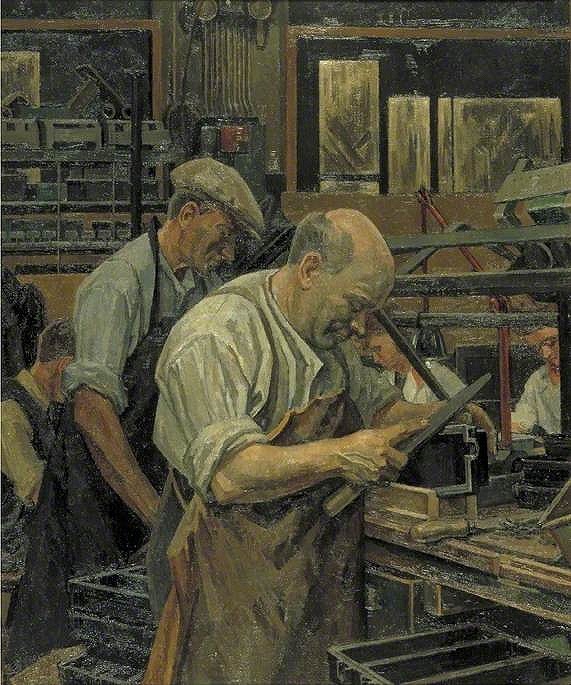MannerOfWorking

Percy Frederick Horton: Blind Workers in a Birmingham Factory (Circa 1940s)
"What approach am I deploying as if it was essential?"
Five weeks into the Villa's refurbishment and I've started questioning my MannerOfWorking. Early on, I could engage productively and mindlessly, an easy feat since I was inexperienced doing most of the work my assignments entailed. I was just learning to pull nails from the bottom of boards so I didn't yet know enough to consider embellishments on the standard brute force. Kurt Our Painter introduced me to what he believes to be one of the absolutely essential tools in his considerable arsenal, The Big Fucking Pliers. The BFPs are not for fiddling with nuts and bolts. They bring a measure of brute force to a task. Cast forged steel, they weigh heavy in the hand and prove handy in a hundred ways, one of those being pulling countersunk nails from baseboards. One could choose to pound out those babies and remove them with a crowbar or hammer, but why bother with messing up the board face when it's possible to just remove those nails by the tail, preserving the smooth board face and limiting the damage to century-old fine-grained trim wood? After a few sessions of nail removing, I began to notice different possibilities. Then I began to remove nails more easily. I'd become a more experienced hand. ©2021 by David A. Schmaltz - all rights reserved
The story's the same with refinishing doors. My approach to this work has changed considerably from that first naive attempt into my present more studied approach. Some of what I've learned would have made no sense to my innocent beginner's mind just a few short weeks ago. Now I have rituals which I hold as true, just as if I knew half the alternative possibilities. I don't, of course, so I continue experimenting with various changes. What if I used this other brush? Does order matter? I set up a semi-parallel operation, remembering Frederick Winslow Taylor's caution to limit changes of operation, by which he meant switching back and forth then back again. It makes more sense if I can limit cleaning up to after working on two door surfaces rather than repeating the effort after each and every one. The parallel processing, though, extends what I've come to call Painting Tai Chi, which is the series of curious poses working over horizontal door surfaces forces upon the prepper. These can become excruciating if I neglect to take frequent breaks which seem to limit productivity but might actually enhance it by reassuring that the prepper might survive the session, a perfect example of what I mean when I mention MannerOfWorking.
The term 'prepping' induces visions of sandpaper and primer, but there are many parts of prepping that involve neither. Like most of painting involves no paint, prepping sometimes uses no sandpaper or primer. Prepping the prepper belongs to this class, for I'm finding that I must enter prepping work with a different mindset than painting might naturally induce. The prepper cannot excel if urgently seeking closure. Neither can the painter. If the work seems urgent, I'm learning that I must attend more closely to hasten extremely slowly or my haste might well lengthen the time it takes to complete the task. The prepper seeks problems before solving them. He dare not pretend not to see problems so he can call himself finished. It's a Janis Dance, back and forth, between advocate and absolute devil, each winning for a spell. I feel challenged to see beyond the obvious and imagine better ways to accomplish what I'm doing. Even boredom brings insight, suggesting where the weary prepper might consider alternative approaches.
Language holds no facility for describing specific instances, only general classes. If I say I'm cleaning up the dishes after supper, you might interpret my statement as meaning that I was going to wash those dishes, a common means for cleaning them up, but not by any means the sole method or the only means. We speak exclusively in these general classes of things, even to ourselves. I won't notice the subtle trance my story induces, for I hear myself speaking in specific instances, not in general classes. I instantly interpret my thoughts to mean as I interpret them, not in any potentially helpful broader sense. It takes some effort to abstract backwards from an implied specific into more general class, to recognize the wrinkles that make difference possible. There must be ten thousand ways to deploy The BFP and I've only stumbled upon a small handful of them. If I find myself dissatisfied with my current assignment, I might be wise to consider my MannerOfWorking first. What approach am I deploying as if it was essential? These are the steps most likely to becoming transformationally optional.


